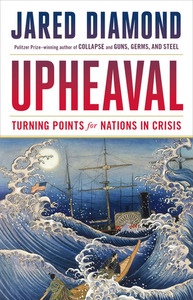Take a photo of a barcode or cover
I really had to remind myself of the parts I liked to give this three stars - after the last two chapters, it barely rated two. The chapters illustrating how various nations delt with a crisis in their history were very interesting. Both the ones covering countries I'm very familiar with, and the ones I know little about. The premise of the book, to apply twelve factors gleaned from helping individuals deal with crisis to how nations handle them became more and more tedious and or farfetched. It felt increasingly like the author was forcing the argument, cherry-picking to make his new tool look attractive. The epilogue was yet another re-iteration of his pet new analytical tool, with appeals for those younger than himself to pick up the flag and carry it forward. I was completely unconvinced. It was a fun thought experiment, beaten to death. Despite all that, three stars because I did learn something from it. Information well presented, anyway.
informative
inspiring
slow-paced
El libro es una historia narrativa anecdótica, con fuentes que son sus propios amigos, sin nombres y apellidos, claro, con poco análisis cuantitativo, aburrido, extenso y sin que aporte nada útil.
informative
reflective
slow-paced
informative
reflective
slow-paced
I like how Jared Diamond challenges my thinking of history and how the flow of events were shaped. Like all really good authors, he keeps me thinking long after finishing the book. With that thinking I grabbed _Upheaval_, as it promised to use history to inform us on how to handle the coming future.
Each of the stories around the slow or fast change a country experienced in the last 150 years or so was quite interesting. The author has a stake in each of the countries, through personal or professional connections. The stories here represent a mixture of historical research & his personal experience in each. I now have a better appreciation of Finland in the 20th century, as he is able to make clear just what kind of knife edge balance they were required to hold. It is also a good example of how investing in the people, especially in advanced education, pays huge multipiers down the road.
From all of this, he then attempts to look at the future. I think the four areas here are spot on. Climate change will kick us in the head faster and harder than we care to admit. But the inability to have intelligent discussions on science and paths forward may be our undoing. Hence upheaval, but without a cohesive response, unlike Finland at the end of World War II. The book provides the historical context of potential outcomes, attempting to spotlight how humans can or can not rise to address existential threats for the better of society.
Each of the stories around the slow or fast change a country experienced in the last 150 years or so was quite interesting. The author has a stake in each of the countries, through personal or professional connections. The stories here represent a mixture of historical research & his personal experience in each. I now have a better appreciation of Finland in the 20th century, as he is able to make clear just what kind of knife edge balance they were required to hold. It is also a good example of how investing in the people, especially in advanced education, pays huge multipiers down the road.
From all of this, he then attempts to look at the future. I think the four areas here are spot on. Climate change will kick us in the head faster and harder than we care to admit. But the inability to have intelligent discussions on science and paths forward may be our undoing. Hence upheaval, but without a cohesive response, unlike Finland at the end of World War II. The book provides the historical context of potential outcomes, attempting to spotlight how humans can or can not rise to address existential threats for the better of society.
Diamond's style of writing is not my cup of tea. I would contend that he is honest in his writing but without appropriate references or citations, the theory seems amateurish and wishy-washy. Overrated.
I learned a lot about the modern history of Finland, Chile, Indonesia, Japan, and Australia and it was really interesting comparing and contrasting the various countries' (including Germany and the US) national crises. But Diamond takes an approach to his analysis through the lens if individual trauma resiliency and translates it to a national level. It works but not completely.
Two chapters near the end look at unfolding crises in Japan and the US and Diamond applies his rubric to analyze how/why the US and Japan are, or in both cases, are not, dealing with the crises. The final chapter is a big summation of the whole book that is snooze-worth and redundant, and which I just skimmed because I read the several hundred pages of the book already. It's a chunky book and if you want to know what he says but don't want to read the whole thing, just go to this chapter for the helicopter overview.
I am glad I read the book, there is much food for thought in it, but it doesn't amount to a must read.
Two chapters near the end look at unfolding crises in Japan and the US and Diamond applies his rubric to analyze how/why the US and Japan are, or in both cases, are not, dealing with the crises. The final chapter is a big summation of the whole book that is snooze-worth and redundant, and which I just skimmed because I read the several hundred pages of the book already. It's a chunky book and if you want to know what he says but don't want to read the whole thing, just go to this chapter for the helicopter overview.
I am glad I read the book, there is much food for thought in it, but it doesn't amount to a must read.
Excellent presentation on how nation states have come to deal with upheavals. This, as with his previous books, requires careful and thoughtful reading. The reader will not be disappointed.
I received an ARC from the publisher in exchange for a fair reading and review.
I received an ARC from the publisher in exchange for a fair reading and review.
Not Jared best, but still a good read. Dragged a bit at the end.




